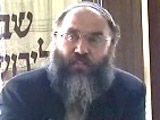- Torah Portion and Tanach
- Vayishlach
31
One of the more perplexing aspects of the encounter is that after the angel bestows a new name upon Yakov – "Yisrael: He who struggles triumphantly with G-d & Man" – Yakov asks the angel what his name is! The angel seemingly does not answer, putting Yakov off by saying, "Why do you ask what my name is?!"
But the Hebrew of this phrase – "Lama zeh tish’al lishmi" – is quite unusual. What is the word "zeh- this" doing in there? It seems superfluous; in fact, the sentence would make much better sense without it, if it simply said: "Lama tish’al lishmi?"
Now, we know that there are no punctuation marks in the Torah; in fact even the separation between words is subject to interpretation. So, if you read the last word ("lishmi") as two words instead of just one, you get the phrase, "lama zeh tish’al li: sh’mi," meaning, "‘Why do you ask me this’ IS my name!"
Rashi & other commentators identify Yakov’s adversary as Esav’s guardian angel, a malevolent figure who meant to do harm to Yakov & his (Torah) way of life. And so his self-declared name, & essence, make a lot of sense. For the philosophy of, "Don’t ask me any questions!" is indeed a serious threat to Torah learning & the acquisition of spiritual knowledge. It is davka via the medium of asking the most probing & penetrating questions that we confront & challenge the subject at hand, & ultimately arrive at the truth.
Every Yeshiva student who has ever learned Gemara knows that the Rebbe gives you one point for a great answer, but two points for a good question!
We live in a world where, too often, many Jews are told, "Why do you ask me this - don’t ask any questions! Accept whatever you are told, without any doubt or delay!" To question authority is heresy, blasphemy, apikorsis! But that is a very wrong and dangerous attitude; the entire Talmud, in fact, is one long series of questions - & approaches.
After the Exodus from Egypt, Moshe tells Bnei Yisrael (Ex. 13:14): "V’haya ki yish’alcha bin’cha machar laymor: Mah Zot?….And it shall be, when your son asks you tomorrow what is this (the Pesach ritual), you shall tell him….etc." With a touch of Rabbinic license, we can read the phrase a bit creatively: "When your son asks you a question, then you know there will be a tomorrow," a future for the Jewish People.
The mark of a Jew, without question, is the Question Mark.

JUST ONE MITZVA CAN CHANGE A LIFE
Rabbi Stewart Weiss | Kislev 11 5778

“Not Yaakov … but Yisrael”
Rabbi Yossef Carmel | 11 Shvat 5784

Vayishlach Collective Responsibility
Rabbi Jonathan Sacks | 6 Shvat 5784

The Double Conflict
Parashat Vaishlach
Rabbi Jonathan Blass | 5765

Forgetting a Day of Sefirat Ha'Omer
Rabbi Yosef Tzvi Rimon | 5778

The Halachot of Pidyon Haben
Rabbi Yirmiyohu Kaganoff | 5769

seudat hodaya
Rabbi Daniel Mann | 5772

Milk Spoon in a Meat Sink or Dishwasher
Kashrut in a Nutshell
Rabbi David Sperling

P'ninat Mishpat: Unsuccessful Transfer of Yeshiva – part IV
based on ruling 82138 of the Eretz Hemdah-Gazit Rabbinical Courts
Beit Din Eretz Hemda - Gazit | Nisan 5784

Refuting Criticism by the Ridbaz – #311 – part IV
Date and Place: 19 Sivan 5670 (1910), Yafo
Beit Din Eretz Hemda - Gazit | Nisan 5785

The Solution to 'Risky' Intellectual Topics
Ayn Aya, Shabbat v, 72
Rabbi Ari Shvat | Nisan 5785






